
Volume 2 | Issue 6
March 28, 2025


Volume 2 | Issue 6
March 28, 2025
Challenge
by Philip J Vonada National Grange Communications Director
April is just about here, so it’s time to celebrate Grange Month! This year, National Grange President Christine E. Hamp has set an exciting challenge to encourage Grangers nationwide to strengthen their communities while growing their Granges. The Grange Month Challenge is a four-part initiative to foster engagement, service, and advocacy. Follow these steps on how your Grange can take part and make this celebration meaningful:
1. Bring a Friend to the Grange
There’s no better way to strengthen the Grange than by introducing new people to its mission and values. Invite a neighbor, friend, family, or community member to a meeting or event. Share personal stories about how the Grange has made a difference in your life and community. Consider hosting a unique open house, potluck, or social gathering where prospective members can learn about your Grange and its impact on your community in a friendly, welcoming atmosphere.
2. Start a Community Project and Share It
The heart of the Grange is community service, and this is a great time to launch a new initiative! Whether you’re cleaning up a local park, starting a community garden, or organizing a clothing drive, your project can make a lasting impact. Be sure to share your efforts on social media using #GrangeMonth25 to inspire others and highlight the good work your Grange is doing.
Active and civil civic engagement is key to making a difference. Attend a town hall, school board, or city council meeting and speak up on issues that matter to your community. Encourage fellow Grange members to join you in advocating for policies that support agriculture, rural development, and education. Consider hosting an informational session beforehand to discuss pressing local topics and prepare remarks.
Food insecurity is a growing concern, and the Grange can be part of the solution. Project Sustenance promotes food security and self-reliance through food drives, community gardens, and educational workshops. Partner with local food banks, farmers, and organizations to provide fresh, nutritious food to those in need. Your Grange could also offer canning or gardening classes to teach self-sufficiency skills that benefit families long-term. You could also consider using Grange Month to open your own “Little Free Food Library” at your Grange Hall or in the community. Project Sustenance is not just about food insecurity, though - also consider projects that could foster self-sustainability and community resilience.
By participating in the Grange Month Challenge, your Grange can make a real difference while strengthening bonds with members and the community. Please share your stories, celebrate your successes, and make this April a month of action, connection, and positive change!

• Bring a friend to the Grange –introduce them to your Grange’s mission and family.
• Start a community project and share it on social media with #GrangeMonth
• Attend a local government meeting and speak up on an issue that matters to your community.
• Connect your Grange to Project Sustenance to battle food insecurity and build communityand self-resilience.
by Philip J Vonada National Grange Communications Director
From March 15-18, the National Grange Young Adult, Youth, and Junior Ambassadors took Washington, DC, by storm, to celebrate National Ag Day and participate in Ag Day activities. National Grange was included with student leaders from Agriculture Future of America (AFA), National FFA, and the National 4-H Council, making their voices heard on rural issues and agricultural policies that shape our nation
All five Ambassadors – Young Adult Ambassador Ashlan Smith, Youth Ambassadors Shae Smith and Taylor Rogers, and Junior Ambassadors Laci Liles and Justin Dusko – participated in the activities.
Before arriving in DC, the Grange Ambassador Teams met via Zoom with Derek Snyder, CFO of Versant Strategies and a former National Grange Youth Ambassador, where they sharpened their advocacy skills and learned how to align their personal priorities with Grange policy.
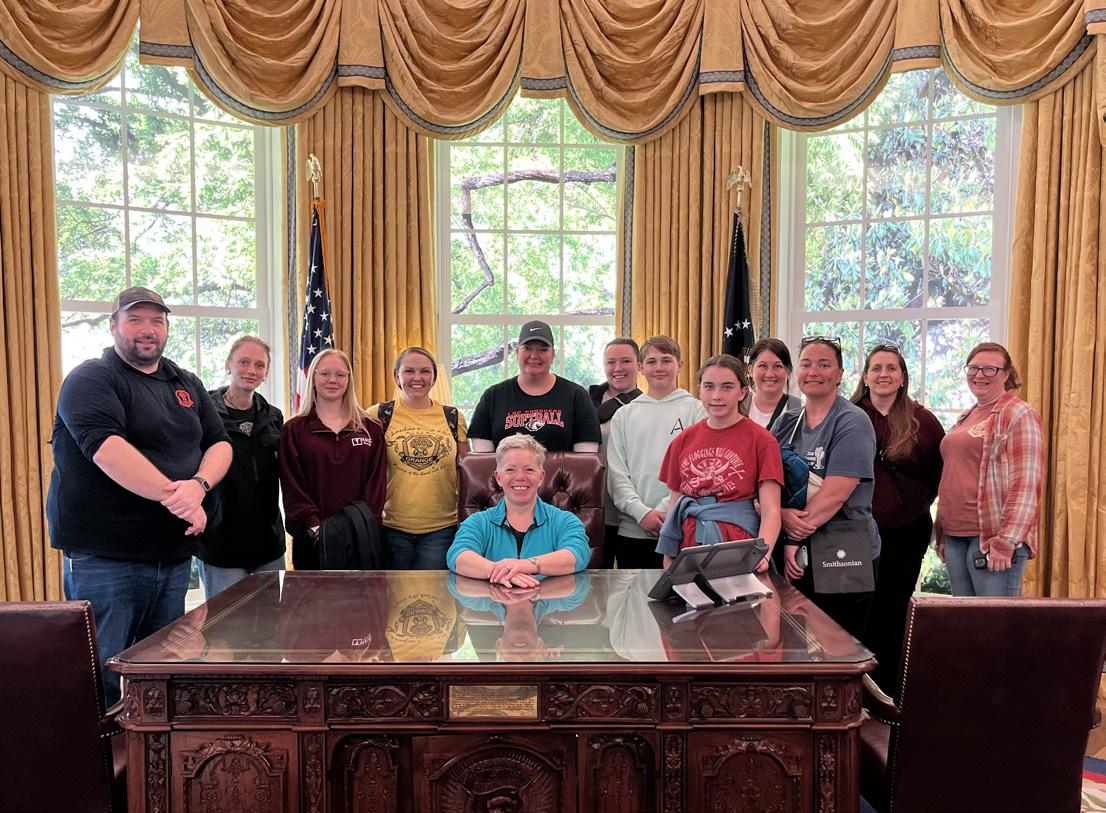

down with House Agriculture Committee staff members. Thanks to an invitation from Representative Glenn “GT” Thompson (RPA), Chair of the House Ag Committee, they gained firsthand insight into legislative advocacy and the committee’s role in shaping agricultural policy.
The afternoon brought opportunities to network with AFA, FFA, and 4-H student leaders while diving deeper into the advocacy process. Later, the Grange contingent attended a reception at the National Press Club, hosted by Agri-Pulse, followed by a rooftop pizza party at John Deere’s headquarters— just steps from the National Grange office.
On Tuesday, March 18—National Ag Day—the Ambassador Teams and National Grange staff attended the official Ag Day kickoff at the U.S. Department of Agriculture, which included a video message from USDA Secretary Brooke Rollins and remarks from Brooke Appleton, USDA Deputy Undersecretary for Farm Production and Conservation, and Zippy Duvall, President of the American Farm Bureau Federation.
continued on page 11
Once in DC, the Ambassadors balanced business with adventure—exploring the city, mastering the metro, and engaging in team-building before hitting Capitol Hill. A key highlight was an in-depth discussion with National Grange staff about how youth can shape the future of the organization and how the Grange can better serve them.
On Monday morning, March 17, the Ambassador teams and National Grange staff, including President Christine Hamp, Legislative Director Burton Eller, Communications Director Philip Vonada, Membership/Leadership Development Director Amanda Brozana, Junior Director Rebekah Hodgson, and Youth Advisory Team members Jen Danko and Jennie Gentry, as well as parent chaperones Nancy Dusko and Anna Liles, had a sit-

by Philip J Vonada National Grange Communications Director
Since her election and installation in November 2023, National Grange President Christine Hamp has repeatedly said, “If we’re not having fun, why are we doing it?”
To emphasize this point and “walk the walk,” she recently appointed a National Grange Director of Fun: Paul Hanks, a member of Rio Linda Grange #403 in California.
The Director of Fun will “enhance engagement, excitement, and enjoyment across all levels of the Grange,” said Hamp. Hanks’ key responsibilities will include creating and promoting “fun” within the Grange, encouraging and innovating fresh ideas for events and celebrations that align with Grange values, recognizing and celebrating members and Granges, and encouraging intergenerational engagement.
“My goals as Director of Fun are to work on developing a relationship with Granges that are struggling with membership and motivation and help strengthen event planning,” Hanks said. “I would like to inspire Granges to plan fun programs that everyone can participate in, laugh at, and feel a sense of family.”
Hanks believes that fun is important because time is precious – by asking people to volunteer, they should be rewarded with smiles. Fun events aren’t meant to replace Lecturers’ programming but to create and incorporate ideas that motivate a fun atmosphere where all members of the family can participate. “Granges need to incorporate FUN. They should have at least one successful event a year that everyone, young and old, leaves the event laughing and talking about coming again next time! Find out what your community is needing then have a ice cream sundae meeting and plan a FUN event,” said Hanks.

State Grange President Joseph
and Paul’s wife, Susan, CA State Grange Treasurer,
were delegates at the 158th Annual National Grange Convention.
“If you’ve met Paul, you know exactly why he’s perfect for this position,” Hamp said, “and if you haven’t met him yet... I can’t wait for you to! His passion for the Grange, his out-of-the-box ideas, and his ability to work with anyone are all inspirational and will hopefully have everyone ready to innovate and have more fun. “
Hanks aims to embrace this role with passion. His vision is to offer resources to Granges to close the generational separations and indifferences, by encouraging simple, silly programs and fun events that level the bar for all generations – like pie eating, ice cream parties, or how many mini marshmallows you can fit in your mouth And, most importantly, rewards for participating. He says, “I LOVE this organization, and I may not have all the answers, but I will do my best to help revive and encourage all the FUN we can!”


The National Grange joined 65 small business groups to thank Treasury Secretary Bessert for suspending enforcement of business ownership disclosure requirements for domestic businesses. The new rule, implemented last year, was intended to catch foreign money-laundering schemes masquerading as U.S. businesses. But the way the Treasury wrote the rule, it required all businesses to comply, even small farms, ranches, and businesses that had been American-owned and operated for decades. Many of these reported spending thousands of dollars in attorney fees just to register for the process. Treasury said it would develop a new rule to restrict reporting requirements to foreign entities only.
USDA releases market, disaster, and conservation aid
Agriculture Secretary Brooke Rollins has released the $10 billion in market relief for row crop producers that was authorized by Congress in December. Congress also authorized $21 billion in disaster aid to be released. In addition, the department is releasing conservation program payments for the Environmental Quality Incentive Program (EQUIP), Conservation Security Program (CSP), and Agricultural Conservation Easement Program (ACEP).
Improper payments in SNAP and Farm programs
The Government Accountability Office (GAO) says the USDFA is one of 16 federal departments and agencies that reported improper payments totaling $162 billion in fiscal 2024, including $10.5 billion in the Supplemental Nutrition Assistance Program (SNAP). Significant improper payments were also found in farm commodities and conservation programs.
More rural veterinarians needed
The National Grange joined the American Veterinary Medical Association in supporting the bipartisan, bicameral Rural Veterinary Workforce Act introduced by Senators Crapo (R-ID) and Smith (D-MN) and Representatives Smith (R-NE-3) and Larson (D-CT-1). This bill would bolster funding to USDA’s Veterinary Medicine Loan Repayment Program and add incentives for rural communities to gain access to the veterinarians they need to ensure animal health and welfare, food safety, prevent disease, and maintain public health.
At least $500 million destined for food banks nationwide has been suspended. The administration argued that the previous administration had created unsustainable expectations for supplementing the Emergency Food Assistance Program through the department’s Commodity Credit Corporation spending authority. The department will continue to purchase food for the program through appropriated funds and Section 32 (surplus commodities) purchases. However, the USDA did terminate the Local Food Purchase Assistance Cooperative Agreement Program and the Local Food for Schools Cooperative Agreement Program, which provided locally grown foods to food pantries and schools. Hunger has ticked up in recent years with rising inflation and the end of pandemic-era emergency feeding programs.
EPS Administrator Lee Zeldin says his agency and the Army Corps of Engineers will begin the work of coming up with a new rule to define the Waters of the United States. Bodies of water that fall under the WOTUS definition are subject to federal jurisdiction under the Clean Water Act. Previous administrations, including those of Obama, Trump’s first, and Biden, have all tried to craft rules that would stand the test of time, but all attempts at doing so have been met with lawsuits. WOTUS is now defined one way in 24 states and another way in the remaining 26 as a result of these lawsuits.
The National Grange, rural lawmakers, and other rural advocates have been pushing to give Medicare a two-year extension on its flexibility to provide telehealth services, including mental health, to its patients. Congress gave Medicare the flexibility to provide telehealth services during the COVID-19 public health emergency, but that flexibility was set to expire on March 31. The authority for some Medicare telehealth visits to use audio-only technology was also set to expire. There was bipartisan and bicameral support for a two-year extension, and it was included in the Continuing Resolution Congress passed on March 14.
The National Grange and senior patient advocates are urging the leadership of the House and Senate to support the Equitable Community Access to Pharmacist Services Act. The legislation would provide payment for essential pharmacist services under Medicare Part B. Operating within the state scope of practice laws, the legislation would ensure seniors can access essential testing, treatment, and vaccination services at the pharmacy. For seniors living in rural areas, the pharmacy is often the first and only stop they make for critical health services. Rural Medicare patients visit their community pharmacist fourteen times per year, compared to just five times their primary care physician.
The Supreme Court is set to rule on the constitutionality of the Universal Service Fund. The USF is a user-fee-based support program that subsidizes broadband and telephone services in high-cost (typically rural) areas for low-income households,
schools, and libraries. It is funded through assessments from telecommunications providers based on a percentage of their interstate voice service revenues. An advocacy group, Consumer’s Research, filed lawsuits in several courts, with the Fifth Circuit finding USF unconstitutional. If SCOTUS also finds the USF unconstitutional, Congress will need to find a funding solution, or millions of citizens will lose service if they live in areas served by USF.
is written and compiled by Burton Eller
National
Grange Legislative Director beller@nationalgrange.org

submitted by Carrie Nace PA State Grange Legislative Director
Have you ever wondered as a Grange member, how you can get more involved in advocating for Grange policies? Wanted to get involved in the legislative process but not sure where or how to start? Now is your opportunity to gain experience! The Pennsylvania State Grange is offering an online training session related to the Grange’s legilative advocacy efforts on Thursday, April 10th at 7:00 pm ET.
While the training will draw on experiences of seasoned Pennsylvania legislative professionals, the information will be general in nature and give any Grange member the comfort to take on advocacy.
Topics covered include, why do we advocate for Grange issues, what is the difference between advocacy and lobbying, how a bill becomes a law, tips and
tricks for meeting with an elected officials, commonly used terms and phrases and so much more.
The only way the Grange continues to be successful at both the state and federal levels is a collaborative effort of both our state and national advocacy teams, combined with a strong presence of our members in our advocacy efforts. Grange members serve as a great resource to elected officials, and it is a fantastic opportunity for you to be a voice on rural issues in your state and in DC.
If you are interested in joining us for this important training, please RSVP to Bernie Comfort, PA Public Relations Director, at publicrelations@pagrange.org.
Be sure to encourage a friend or fellow Grange member to join you for this great training opportunity. Look forward to seeing you there!
In addition to the advocacy training

session, the PA State Grange is launching a “virtual food drive” as a part of the state’s inatitives with Project Sustenance. From April 1-30, donations will be accepted for the Central PA Food Bank, which serves more than 200,000 individuals in 27 counties of Pennsylvania.
Donations can be made at https:// centralpafoodbank.donorsupport.co/-/ NSQAPJHE

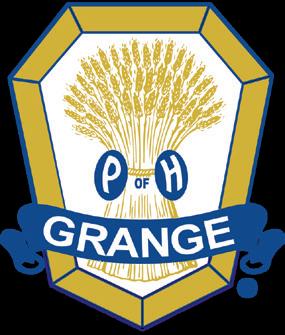
The National Grange believes that engaging with legislators and local elected officials is a critical way to ensure our voices are heard in the decision-making and policy-shaping process. By actively participating in the political process, individuals – especially Grange members - can help shape legislation that impacts their livelihoods, families, and local economies. We encourage everyone to contact their elected representatives, attend town hall meetings, and become informed advocates on issues that matter most to you and to your community.
Locate your state and federal legislators using www congress gov for federal representatives and your state’s legislative website for local officials. You can also use www.usa.gov/elected-officials to find all your elected officials.
Note their office locations, contact information, and any scheduled public meetings or town halls
Call or email your legislator’s local office to request an appointment Make sure to start this process at least two weeks in advance of your preferred meeting date.
Be clear about your intent: "I am a constituent, and a Grange member interested in discussing [specific issue]."
Be flexible with timing and willing to meet with legislative staff if necessary. For most federal officials, it is more likely that you’ll get a meeting with a legislative assistant or other staff member than a face-to-face with your official.
Stay informed about key issues affecting your community and Grange priorities.
Utilize National Grange and your State Grange resources for position statements, policy briefs, and talking points. The National Grange Journal of Proceedings has the most up-to-date National Grange policy. For your State Grange policy, reach out to your State Grange Legislative Director or President
Assemble a small group of Grange members if possible; numbers add strength. Keep your message focused – state the issue, explain its local impact, and propose a solution. If you don’t have a solution in mind, ask the official how THEY feel you could be proactive in solving the issue Bring supporting materials, such as local statistics or personal stories
Be professional, polite, and concise. Share a personal connection to the issue to make a lasting impression. If applicable, ask for specific action, such as sponsoring or supporting a bill.
Leave behind a business card, a brochure from your Grange, a magazine/newsletter, and your contact information
Send a thank-you email or letter summarizing key points from the discussion. Stay in touch with the office by providing updates and attending public events
Encourage fellow Grange members to engage and reinforce your advocacy efforts. Invite the elected official to a Grange meeting if appropriate – they can discuss the issue further with your members.
Develop an advocacy routine and keep it going
A consistent routine of holding and/or attending regular events as well as face-to-face appointments will establish your Grange as being interested in the public policy process
Inform the National Grange, your State Grange, and your local Grange about your advocacy efforts. Share your experience on social media and within your community. Ongoing engagement will build lasting relationships with policymakers and staff.

Grange Policy is wide-reaching and meant to benefit as many Americans as possible –particularly those in rural areas and small towns. It is possible that your personal beliefs may not align with Grange policy. So, what do you do then?
First, remember that you arranged a meeting to represent your Grange – if an issue comes up that doesn’t sit right with you personally, keep the Grange’s interests at heart.
Second, stay professional You have the right not to engage in a conversation about a particular issue, or to gently steer the conversation back.
You can suggest amendments to Grange policy later by writing a resolution suggesting a change This would pass through the resolution process – from local to State Grange, then to National Grange if appropriate. Remember that all Grange policies exist because of individual members’ ideas and participation in this grassroots process.
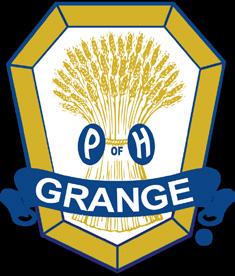
Grange Spirit Week Grange Spirit Week Grange Spirit Week April 13-19 April 13-19 April 13-19

Each day during Grange Spirit Week, we invite you to share our posts, engage with the topics, and share why you are proud and excited to be a Granger! Let’s flood social media with #GrangeMonth25 and show why being #GrangeStrong is so important for our communities, as well as our individual well-being Take a look at the daily images and prompts below, so you can be prepared to share!
All graphics can be downloaded at nationalgrange.org/grange-month-2025, or shared directly from the National Grange’s social media on the days listed.
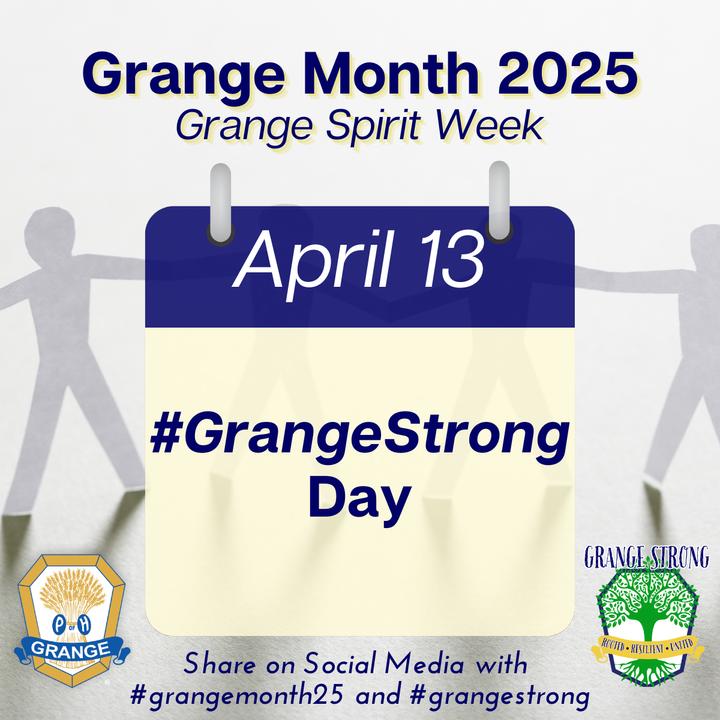


Sunday, April 13
#GrangeStrong Day
Show off what makes your Grange strong! Share a photo, memory, or moment that represents the strength of your Grange family

Tuesday, April 15
Talent Tuesday
Grangers have talent! Whether it’s music, art, baking, woodworking, or any other skill, we want to see it! What’s a talent that you have honed through the Grange OR you would like to learn more about in the Grange?
Thursday, April 17
Grange Apparel Day
Rock your Grange gear today! Post a selfie in your favorite Grange apparel, from vintage shirts to new swag Let’s see that Grange pride!

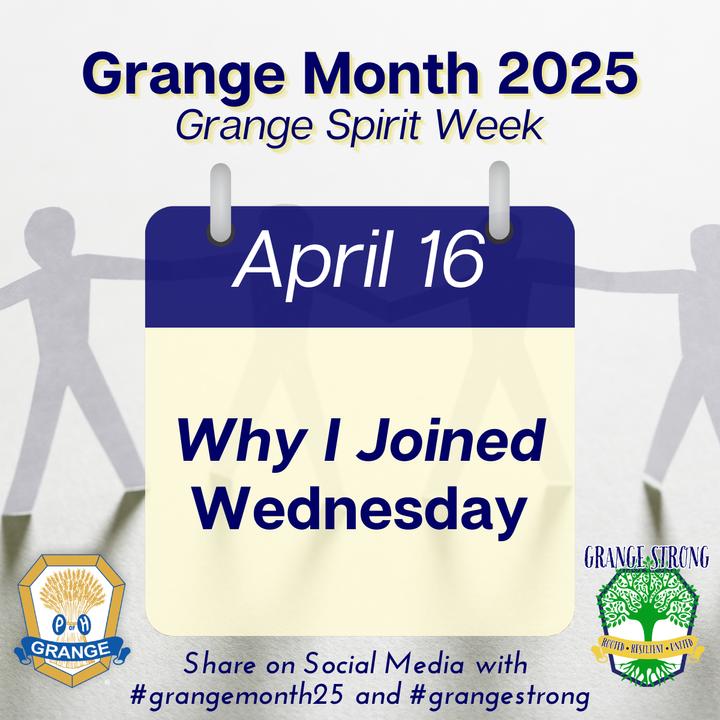

Saturday, April 19
Grange Future Day
The future of the Grange is bright! Share what excites you about the next generation of Grange members, upcoming projects, or your vision for the future.
Monday, April 14
Service Spotlight Day
How does your Grange give back? Share photos of your latest service projects, acts of kindness, or a story about how your Grange has helped the community Let's spread the good work!
Wednesday, April 16
Why I Joined Wednesday
What inspired you to join the Grange? Was it the community, the mission, or the friendships? Share your Grange journey in a post or video and tag others to do the same!
Friday, April 18
Parade Day
Parades are a tremendous source of community pride and engagement, showing off the great organizations in your hometown How has your Grange participated? Whether recent or a “throwback,” let’s show the world how Granges enjoy parades!
by Bonnie Mitson and Randee Farmer National Grange Community Service Co-Directors

Major initiatives or events that deserve ongoing attention
• The National Grange Community Service Department realizes and understands that the benefits of a community service program are noticeable within the community. A successful event attracts new people to see what is going on within the Grange, especially when including the entire family. Grange Halls can become a “happy safe place” where folks come to visit and be inspired or learn a new skill.
• The National Grange Community Service Department believes that inactive Granges can become active Grange by the opening of minds to the needs of the community.
• The National Grange Community Service Department encourages the continual communication and sharing of community service activities to inspire other Granges across the nation.
Opportunities for engagement – ways members and communities can get involved beyond April
• Get back to basics with a simple hello and thank you. We encourage Granges to use one week a month to specifically say hello and thank you to other groups/non-Grangers within their community. In the past, making cookie plates was a common and recognizable Grange community service project. For those not still doing such on a regular basis, it’s time to bring back the time-tested tradition of a simple plate of cookies delivered with a handwritten thank you “for being an important part of our community” card. What a perfect way to keep Grange Month front and center every month. Our vision is that Saturday would be a baking day. Get together at your Grange Hall to bake and write thank You’s. (Consider inviting a local 4-H club, for example, to come help.) Package up plates of goodies and decide who they will be delivered to during the week. Places to consider but not be limited to: school offices, hospital staff, EMS
stations, doctors’ offices, city offices, police stations, fire stations, pharmacies, lumber yards, church offices, daycare facilities, Lions Clubs, or senior centers. Be sure to include Grange contact information along with your thank you note.
Success stories or impact highlights that showcase the Grange’s value
• We have recently become aware that Granges are providing their Halls for activities no longer being held at other facilities. Activities include fitness and exercise classes, first aid responder classes and nutrition classes.
• We encourage participation in exciting new programs such as Project Sustenance and continued involvement in successfully established projects including Rural Minds, Quilts of Valor, and the Dictionary Project.
• Ideas for enhancing your programming through increased visibility and member participation.
• In February, we made contact via email with State Community Service Directors detailing the 2025 National Grange Community Service program and asked for their projects and details be provided to us to share with others.
• We have provided easy-to-fill out online form for State CS Directors to complete year end reports and submit to us automatically at the click of a submit button. This form will be the justification for us to request $250 award from National for 25% of total Subordinate Granges within a State participating in community service activities. Electronic certificates will be sent to State Community Service Directors as appropriate for presentation purposes.
• We have created a simple online form for Community/ Subordinate Grange Community Service Directors to submit as they complete a project, including details and photos, that comes to us automatically. Our hope is to use this information to highlight projects in a timely year-round basis to Grange publications for recognition and “how-to” inspiration for other Granges.
• We plan to start Zoom meetings with State Community Service Directors on a regular basis to allow a open dialogue of successes and issues/suggestions that can be addressed for continued growth. Please stay tuned We will reach out when this is ready to roll out.

by Todd A. Gelineau Secretary, Connecticut State Grange originally published
in the Connecticut Granger
Recently, I received a note from a Grange secretary indicating they had tried to file their 990N E-Postcard and paid the associated fee and were informed their filing was rejected.
There are several problems with this. First, there is no fee for filing a 990N with the IRS. Second, the State Grange files all 990s on behalf of Connecticut Granges. Third, the website accessed by the Secretary was not affiliated with the IRS. Because of this, they are not authorized to accept filings and are only taking money from organizations and individuals trying to file their e-postcards with the IRS.
This is an easy mistake to make. It is likely this Secretary Google searched 990N E-Postcard and clicked on the first listing that seemed correct. Unfortunately, such a search will return
many listings for bogus websites willing to take your time and money in filing erroneous e-postcards.
Similar problems have been encountered when Granges have tried to file their annual reports with the
Connecticut Secretary of State’s office in Hartford.
When dealing with the IRS the address should always end with IRS.gov. There should never be a fee for filing a 990. Just like the IRS, there are bogus websites out there accepting money for filing your incorporation reports with the state. Please be alert and contact me if you are unsure or have questions!

The official IRS website looks like this - note the “An official website of the United States Government” tag in the upper left corner. Screenshot of the irs.gov website

Youth Ambassador Taylor Rogers participated in the student panel discussion at the event. This panel focused on the Ag Day theme “Together We Grow,” asking how youth – and adults – can come “together” for the future of agriculture.
One of the most inspiring moments of the event was Youth Ambassador Taylor Rogers’ participation in a student panel discussion on the Ag Day theme, “Together We Grow.” Rogers emphasized the power of unity in agriculture: “Without being ‘together’ as a united front to fight for what we need in agriculture, we really can’t get anything done,” she said. “Being able to communicate with each other with a nonpartisan look… coming together not by political affiliation but by our beliefs in agriculture and what we want for the future, we can grow to build that future.”
The full USDA event can be viewed at https://www.youtube.com/ watch?v=IQZwSGDaqUo

leaders from the National Grange, National FFA, AFA, and National 4-H Council gathered in the House Ag Committee room to discuss agriculture policy and rural issues with committee staffers.
Student representatives attended a special USDA Careers Panel in the Press Room following the USDA kickoff. This panel focused on various careers that are available in the USDA and featured Seth Meyer, USDA Chief Economist; Joseph Parsons, Administrator of the USDA’s National Agricultural Statistics Service; Jennifer Tiller, Senior Advisor to the Secretary for Food, Nutrition, and Consumer Services; and Daniel Whitley, Administrator of the USDA Foreign Agricultural Service.

In the afternoon, meetings were held with staffers from both the House and Senate Ag Committees, learning more about the complicated process of making and enacting
agricultural policy, including the Farm Bill.
The Ambassadors each had meetings with staffers from either their Representative or Senator to discuss the issues that are important to them, including conservation, milk pricing issues, vocational education, and more.
The day finished with a reception in the Kennedy Caucus Room of the U.S. Senate, where leaders in agriculture, rural issues, legislative staff, and more were able to meet and discuss important issues.
At National Ag Day, the National Grange Ambassadors represented the Grange with pride and honor, each gaining valuable experience to help them on their Grange journey.
Since its inception in 1973, National Ag Day, organized by the Agriculture Council of America, has served as a platform to highlight the essential role of agriculture in our daily lives. This year, the National Grange made sure its voice was heard loud and clear.
This April, State Grange Presidents are urged to “take action” as a part of a new National Grange program and to use Grange Month to be especially proactive in promoting the Grange.
Building on the success of the Grange in Action program, Grange Sales, Benefits, and Member Programs Director Loretta Washington introduced the new “State Grange President in Action” this year.
The guidelines are simple: submit one letter-sized page with color photos and a brief caption of at least three (3) various events/activities/meetings you attended as State Grange
President between September 1, 2024, and August 31, 2025.
Adding in an event that includes and builds on Project Sustenance will earn the Diamond level, and a mental health program/event will qualify you for the Golden level.
We hope to see 100% participation from State Grange Presidents - get out, get active, and share the love of the Grange as we build for the future!
Learn more about this program and the guidelines at https://www.nationalgrange.org/state-grange-in-action.



